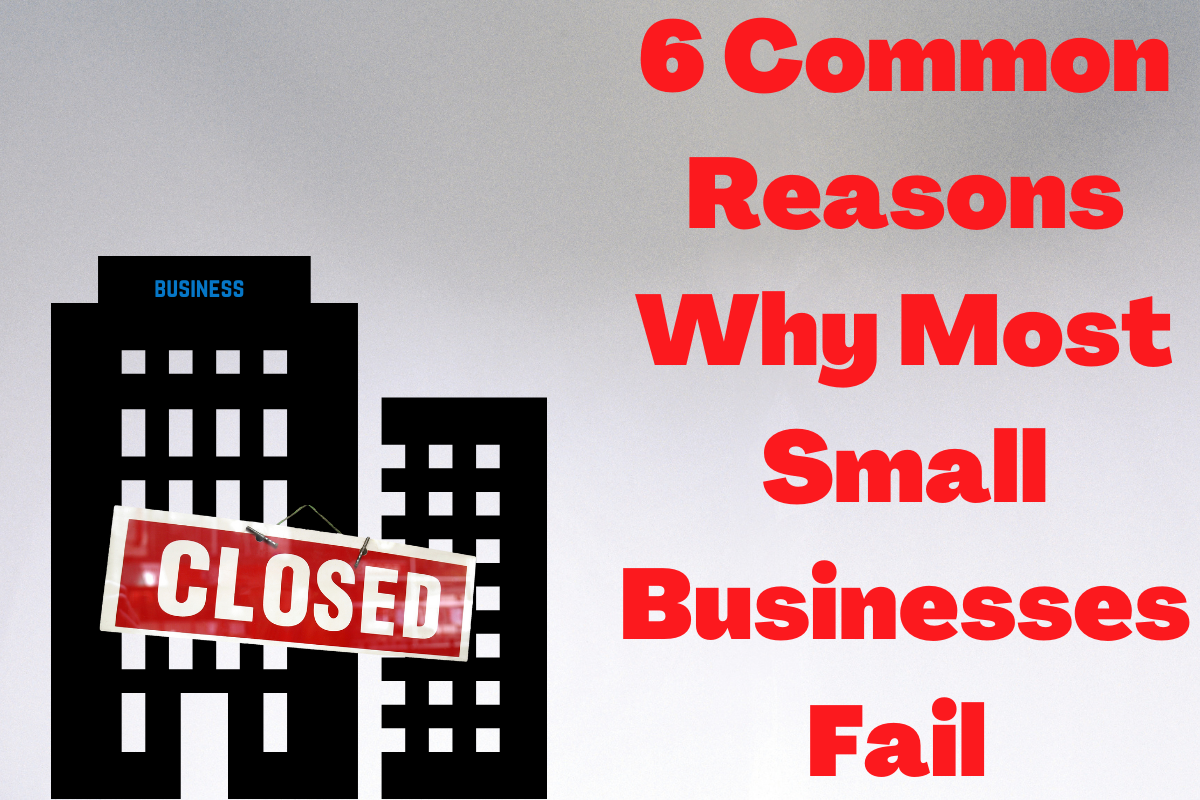6 Common Reasons Why Most Small Businesses Fail

Anyone that opens a new business starts small. The same is true of even the largest companies such as Amazon and Airbnb, to name a few: they all began as small businesses.
However, businesses have to grow over a period of time. And to grow a business requires intense hard work and astute judgment.
Unfortunately, anything between 60 percent and 90 percent of all small businesses flounders and fails within the first two to five years of opening.
Thus, the entrepreneur faces losses as well as mental stress and some level of ignominy.
Actually, there are six common reasons why most small businesses fail. In this article, we will explore and discuss these six common reasons that cause small businesses to fail.
Six Reasons for Failure of Small Businesses
Usually, the business owner or entrepreneur is to blame for the failure of any small business. Now, this might sound a bit unforgiving or harsh to business owners.
However, if we look at the six common reasons why most small businesses fail, it would be evident that a lot of blame lies on the owners.
Here’re the six common reasons for businesses to flounder and fail.
No Business Plan
There’s an old axiom that states: “Failing to plan is planning to fail.” That’s exactly one of the main reasons for a business to fail.
A lot of entrepreneurs open a business with a half-baked business plan or sometimes, no business plan at all.
A business plan outlines various important features. These include the target customer, projections for growth, proper utilization of capital and profits and staffing, among other elements.
Regardless of the nature of the enterprise, a proper business plan is an absolute must. Its serves as a roadmap for business operations and future growth.
A good business plan also outlines how the capital and profits would be used while deciding on the number of employees it requires for smooth operations.
Copycat Business Idea
The second most small businesses fail is because they’re based on a copycat idea from some successful one. Getting an idea and exactly copying the business is totally different things.
It’s worth remembering that not every entrepreneur can successfully copy the business model of another one and yet flourish. So it is always good to look for a unique idea rather than copying someones’ business.
Because a particular business flourishes because of superb management and astute judgement on part of the entrepreneur. A copycat business usually fails because it’s unable to compete on level ground with the successful and established one.
It’s difficult for a newbie business to cut away customers from the older one, unless it has something unique and extra to offer by means of products or services.
And often, there would be more than one successful business in the same field. Therefore, copying a business model could lead to its colossal failure.
Often, copycat businesses get into price wars in the hope of grabbing a quick slice of the market share is one more common reason why small businesses fail.
Usually, small businesses try to cut their rates and sell products or services with minimal profits and sometimes, even at cost price. This is the surest way to disaster.
Because selling with very low-profit margins means that the small business will be starved of enough operating capital.
How to find unique ideas.
Many mentors or experts provide ideas for small businesses online that will help you to find some unique ideas. You can easily find these experts on youtube or blogs, This will not only help you to find unique ideas but also grow your business knowledge too.
Failure to Innovate
Noted management guru and author, Peter F. Drucker says: “Every business has two functions, marketing and innovation.” Very often small businesses ignore both these vital functions to end up as failures.
Aggressive marketing is indeed the key to the success of any business. That’s the only way to create brand awareness as well as the need for the products and services offered by a business.
However, some entrepreneurs don’t exert extra effort on this vital function. Or, their efforts are concentrated on the wrong type of customers.
As a result, they’re unable to muster up a sizeable and significant number of customers that can lead their business to profits.
Also, innovation is the most important part of a business. You may have launched a few products or services in the market. However, consumers always demand innovative products and services.
Unless a small business innovates its products to meet market demand and match or outmatch a competitor’s offerings, it can fail by losing customers.
Poor Financial Management
Poor financial management is also one of the common reasons for businesses to fail. I’m not talking about only managing accounts or keeping track of expenses and income. Actually, financial management means a lot more.
The first rule is keeping a check on income and expenses and eliminating those costs that aren’t really beneficial to the small business.
After all, small businesses mean smaller budgets. Therefore, it’s necessary to have an astute judgment of where the money goes and finding how it would benefit the business.
The second rule is to create a corpus fund. That involves keeping aside some money from profits and investing it in savings plans, stocks, Exchange Traded Funds and other financial instruments to make it grow.
That way, the small business needn’t have to scamper for funds if there’s a shortage of funds for expansion plans or to meet any emergencies.
Zero or Poor Online Presence
We’re all living in the new normal in the aftermath of the 2020 Covid-19 pandemic. As a result, most businesses have shifted their operations to online platforms.
These include a business website, business blog, social media pages and email marketing, among others.
A strong presence on the Internet can actually help get more customers that translate as higher profits and can save the business from doom.
Furthermore, small businesses fail to leverage the power of social media platforms such as Facebook and almost neglect marking a presence on YouTube.
The result is that fewer people know of the business leading to a shortfall of customers.
Along with marking a presence online, it’s also important to do proper digital marketing for the website and blog of the small business to ensure it appears on Google’s Search Engine Result Pages (SERP) that helps it come to the attention of buyers.
Long Payroll
And finally, the problem of long payroll. Often, small businesses start by hiring a lot of people because entrepreneurs believe they’re necessary for day-to-day operations.
That’s a myth. Having too many employees means many redundant hands that are of little or no use to the small business. And this results invariably in longer payrolls.
At the same time, having too few staff or workers means overwork. And overworked employees are always unhappy because it leads to stress.
Additionally, businesses have to pay overtime to employees that work beyond normal work hours which in turn further digs into the profits of the small business.
Business owners are also to blame here in some cases. Often, business owners dig into the profits and cash flows of their enterprise to meet their personal needs.
That’s something wrong since they deprive the business of the much-needed money. Instead, business owners should pay themselves a salary instead of helping themselves to large amounts of cash from the business at will.
In Conclusion
There can be other smaller reasons why a small business fails. One of them is trying to cater to the wrong market. The other is negative reviews from customers.
However, it’s easy to turn around a business and prevent it from going into losses if an entrepreneur addresses the six common reasons why most small businesses fail.






